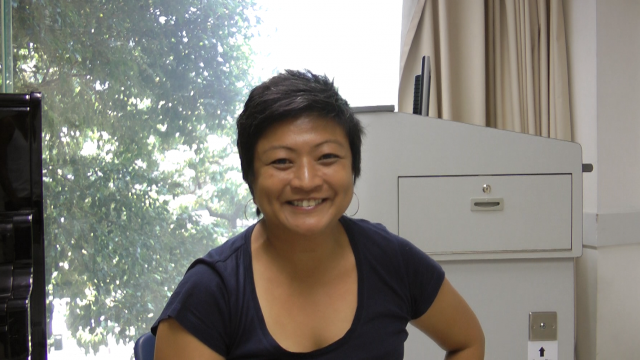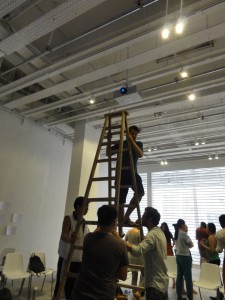
Hybrid-, trans-, cross-, multi-
Culture originates from the Latin word cultura (cultivation) which suggests that culture is everything that has been cultivated. The modern concept of culture bases on the idea of Cicero who thougt of a cultivation of the soul. Combined with the prefix “trans” it represents a popular phenomenon which became some kind of mantra: trans-culturality.
Since globalization made it easy to work, travel, love and live everywhere, people realized that it’s not as easy as that. Trainings, literature and guidelines help to overcome differences which sometimes were not even perceived existing.
Elizabeth de Roza from LaSalle College of the Arts (Singapore) focuses on hybridity, cross-disciplinarity and working between the cultures in her performance oriented practice. In the 3rd week of “Common Stage” she visited as a guest lecturer and mentor for the groups. Her perception of a productive cross-discliplinary and multi-cultural working environment is a third space. That space emerges from the two people’s cultures and backgrounds creating something new when clashing. It is filled with greatest invention, discovery and creativity, Elizabeth de Roza says.
Crossing the borders of disciplines and thought patterns is characteristic for the development of modern art practice. Also science addresses the issues emerging from trans-, inter-, cross- and multi- problems. How does it come then, that it is so hard to get past those issues?
In the process of “Common Stage” the groups were encouraged to reflect their work with focus on the different way of developing an attitude towards the “happy life” subject. Whilst some differences were revealed, the overall impression showed that the participants did approach the tasks differently, but couldn’t agree on the roots of the behaviour. Is it the culture, the discipline, the character or even the mood that day which makes it challenging to work together. “I don’t think you can seperate it”, Elizabeth de Roza says, “We first have to admit that we look at things with our own cultural lenses and prejudices. Then we can go to the next, deeper level.”
When growing together as a group over intense work and new experiences, it somehow disturbs the collective mindset when pointing out distinctions. Elizabeth de Roza states that people in project like “Common Stage” realizing the heterogeneity of the clashing cultures is the first step – and only the first step – for productive trans-cultural and cross-disciplinary working. Watch the summarized interview here:
_
